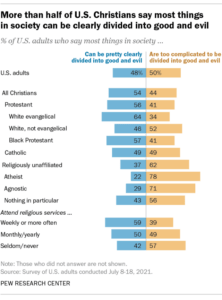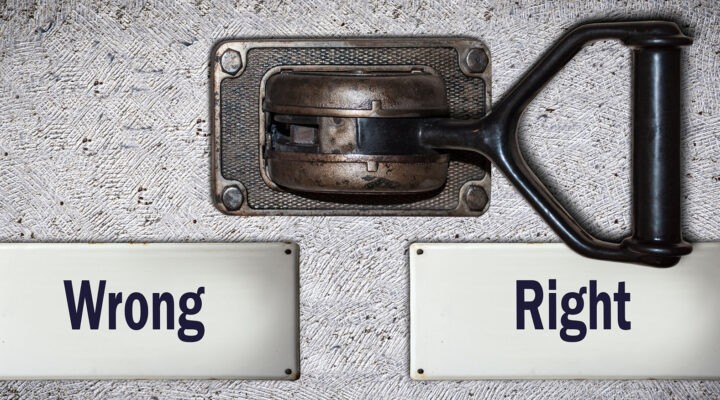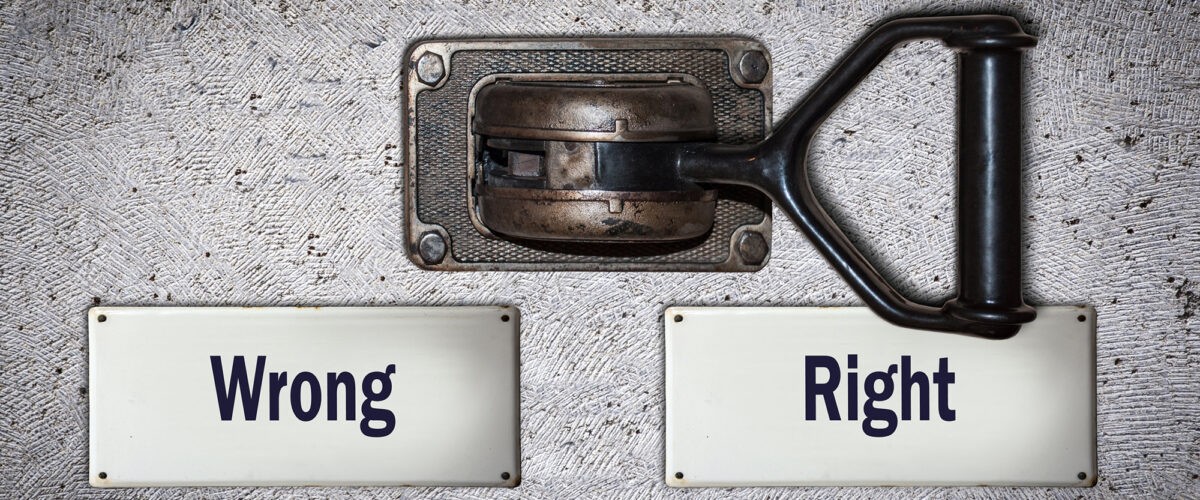It turns out that once again, there are two kinds of people in the world: Those who believe most everything can be classified easily as good or evil, and those who believe it’s not that simple.
Pew Research reports that about half of U.S. adults (48%) believe most things in society can be clearly divided into good and evil, while the other half (50%) believe most things are too complicated to be sorted so neatly.
However, one of the great single indicators of which side of this divide someone will fall is how frequently they attend church. While merely being religiously affiliated greatly increases the odds of believing there’s a clear divide between good and evil, attending religious services at least weekly further increases those odds.
 Then if you are a white evangelical or a Black Protestant, the odds go up again that you’ll see the world more often as good versus evil. White evangelicals (64%) top the list of those usually seeing a clear dichotomy, but Black Protestants (57%) are not far behind. That compares to 54% of all U.S. Christians who hold similar beliefs. Among the religiously unaffiliated, only 37% see an easy good-versus-evil divide.
Then if you are a white evangelical or a Black Protestant, the odds go up again that you’ll see the world more often as good versus evil. White evangelicals (64%) top the list of those usually seeing a clear dichotomy, but Black Protestants (57%) are not far behind. That compares to 54% of all U.S. Christians who hold similar beliefs. Among the religiously unaffiliated, only 37% see an easy good-versus-evil divide.
These data come from a larger Pew survey conducted in July 2021 that has been released in waves. The particular question asked respondents whether “most things in society” can be “pretty clearly divided into good and evil” or “are too complicated to be divided into good and evil.”
Thus, the survey is not a verdict on the existence of good and evil, merely on the likelihood that most things can be sharply categorized. Thus, a strong minority of U.S. Christians (44%) falls in “too complicated” category, not willing to sort everything without nuance. Those likely to see the world in this softer way are white Protestants who are not evangelical (52%), Catholics (49%) and the religiously unaffiliated (62%).
Again, frequency of church attendance also plays a role. Americans who seldom attend religious services (57%) are most likely to see the world with nuance, followed by those who attend monthly or annually (49%) and then those who attend at least weekly (39%).
A previous Pew survey found that highly religious people more often look to God as a marker of good and evil and believe it is necessary to believe in God in order to be a moral person. However, that same survey found a growing share of Americans say it’s not necessary to believe in God to be moral.
Americans’ views about good and evil also vary by political affiliation, yet within those party identifications there are further divisions based on religious identity.
While 59% of Republicans and Republican-leaners see an easy divide between good and evil, Republican Christians (63%) are more likely than Republican “nones” (48%) to hold such views. And Democratic Christians (43%) are more likely than Democratic “nones” (31%) to see the world this way.
Related articles:
Why progressive Christians need to talk more about sin | Opinion by Eric Minton


